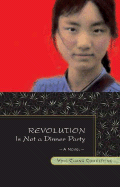
 The title may seem curious at first, but nearly halfway through this gripping first novel, readers discover that it is taken directly from Chairman Mao's own teachings about the class struggle: "A revolution is not a dinner party . . . it cannot be so refined, so leisurely and gentle. . . . A revolution is an insurrection, an act of violence by which one class overthrows another." The book opens in the summer of 1972 in Wuhan, in central China, when narrator Ling is not yet nine years old, and ends shortly after Mao's death in 1976. Although it is a work of fiction, the author explains (in an afterword) that she bases the novel on actual events, and young Ling's unusual situation gives her a vantage point rarely seen in books about this era. In Ji-li Liang's memoir, Red Scarf Girl (1997), which takes place a few years earlier in China, readers observe the author change from a passionate Mao follower to a disillusioned teen; in Peter Sís's The Wall (reviewed in Shelf Awareness, May 24), which covers similar events in Cold War-era Czechoslovakia, the hero similarly comes of age as a Young Pioneer and later grows critical of the oppressive government. By contrast, here Ling starts out suspicious of Mao's teachings and remains so; her challenge is how to stay true to herself while also safekeeping her family.
The title may seem curious at first, but nearly halfway through this gripping first novel, readers discover that it is taken directly from Chairman Mao's own teachings about the class struggle: "A revolution is not a dinner party . . . it cannot be so refined, so leisurely and gentle. . . . A revolution is an insurrection, an act of violence by which one class overthrows another." The book opens in the summer of 1972 in Wuhan, in central China, when narrator Ling is not yet nine years old, and ends shortly after Mao's death in 1976. Although it is a work of fiction, the author explains (in an afterword) that she bases the novel on actual events, and young Ling's unusual situation gives her a vantage point rarely seen in books about this era. In Ji-li Liang's memoir, Red Scarf Girl (1997), which takes place a few years earlier in China, readers observe the author change from a passionate Mao follower to a disillusioned teen; in Peter Sís's The Wall (reviewed in Shelf Awareness, May 24), which covers similar events in Cold War-era Czechoslovakia, the hero similarly comes of age as a Young Pioneer and later grows critical of the oppressive government. By contrast, here Ling starts out suspicious of Mao's teachings and remains so; her challenge is how to stay true to herself while also safekeeping her family.Ling's mother is a traditional doctor of Chinese medicine who uses herbs and acupuncture needles, and Ling's father is a surgeon, trained by Dr. Smith, a Western doctor. Dr. Smith invited Ling's father to practice in the U.S., but ironically considering what was to come, "Father decided to stay to help build the new China." Her father teaches Ling English and encourages her to ask questions. By the second chapter, Comrade Li, the new political officer of the hospital, comes to live in the family's study. He soon strips Ling's father of his surgical duties and puts him to work as a janitor. Compestine does not shy away from the "act[s] of violence" to which Mao refers. A baby doctor commits suicide rather than humiliate her family, an antirevolutionary writer tries to drown himself, and Ling's father is betrayed by a close family friend. But through it all, Ling's father adheres to the physician's creed, a kind of antidote to Mao's teachings ("A great physician should not pay attention to status, wealth, or age. Nor should he question whether his patient is an enemy or friend"). He secretly performs surgery, and saves even the men who would imprison him. His power of example emboldens Ling, who literally fights for food rations and confronts a member of the Red Guard. As readers watch Ling grow ever stronger in her convictions, they also experience the smells, sights and sounds of a nation struggling to find its identity. More than a book about facing adversity, this is an inspiring story of what one young person can do to fight for her beliefs.--Jennifer M. Brown

